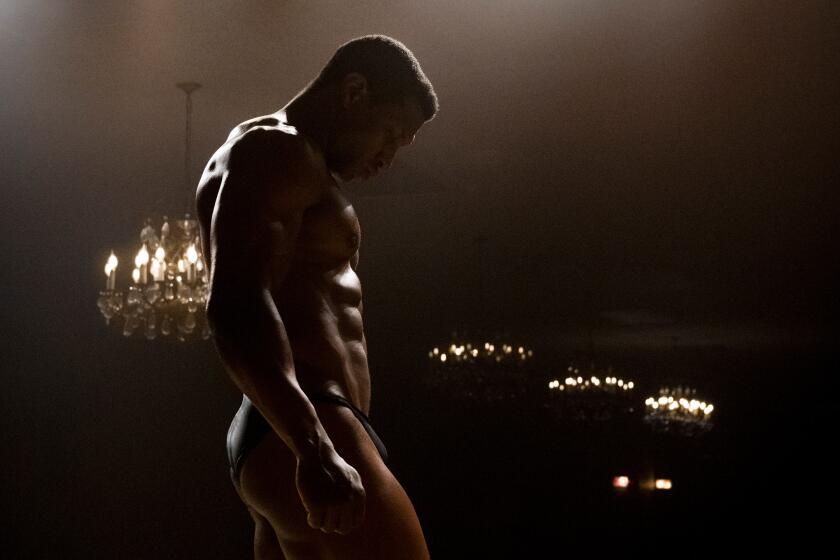Review: ‘Cold Water,’ Olivier Assayas’ brilliant 1994 film, finally arrives in the U.S.
- Share via
There are a few different meanings for the title of the 1994 French youth drama “Cold Water,” an early triumph for the writer-director Olivier Assayas that is only now receiving a proper U.S. theatrical release.
An intimate, enveloping tale of romance and rebellion set in 1972, the film opens in a suburb near Paris but soon follows its 16-year-old characters into the wilderness, eventually coming to rest alongside a rushing river — an unforced metaphor for the turbulent forces that have propelled them to this chilly place of solitude.
Cold water can be restorative, invigorating; it’s also used to describe a buzzkill, a downer. The wonder of Assayas’ fifth feature is that it embodies both these contradictory impulses. Drawn from the director’s personal memories of post-1968 excitement and disillusionment, the drama moves from surging emotional highs to melancholy lows, but it also pulses with a vibrant, moody energy that a 24-year delay from American screens has done nothing to diminish. (Long held up by music-rights clearance issues that have since been dealt with, the movie is opening in a 4K restoration courtesy of Janus Films.)
When “Cold Water” emerged on the festival scene, it announced Assayas as one of a handful of directors, including Arnaud Desplechin, Claire Denis and André Techiné, who were bringing a terrific post-New Wave vitality to ’90s French cinema. In the years since, Assayas has become a critical and art-house favorite, as well as perhaps the most protean and cosmopolitan of working French filmmakers. His restlessly intelligent, genre-defying movies, “Carlos,” “Personal Shopper” and “Irma Vep” not least among them, cross boundaries of language, culture and narrative expectation with enviable ease.
That sense of freedom largely eludes the disaffected, self-destructive high schoolers in “Cold Water,” Gilles (Cyprien Fouquet) and Christine (Virginie Ledoyen), though they are constantly on the move. We first see them together at a record store, where Gilles recklessly shoplifts some LPs. He gets away, but Christine is arrested and turned over to her father (Jackie Berroyer), whom she loathes. Without uttering a word in her direction, he packs her off to a mental institution called Beausoleil. It won’t be her first visit.
Gilles’ home life is a mild improvement, though his recent academic woes — to say nothing of his love of thievery, vandalism and dynamite — have caused no end of friction. Shortly before their latest quarrel, his father (László Szabó), an art lover, marvels at a reproduction of a Caravaggio: “Few images of suffering move me more than this.” The generational disconnect is twofold: It isn’t just that these two barely speak the same cultural language but also that the father seems entirely blind to Gilles’ own suffering.
What strikes you by the end of “Cold Water” is just how fast it moves, how swiftly our time spent with these characters simply slips away. As in any Assayas picture, nothing about the story feels calculated or deterministic, or even especially story-like. But it has a momentum that feels all but inexorable, as though picking up its characters mid-stream and flinging them toward a wrenchingly uncertain future.
That sense of movement finds a visual echo in the handheld kineticism of the camerawork, an instantly recognizable Assayas signature that feels excitingly raw and unvarnished in this early incarnation. The cinematographer, Denis Lenoir, sends the camera racing to keep up with Gilles and Christine, sometimes spying on them through partially obscured windows, sometimes framing them and their actions in disorienting closeups. Clarity is elusive; the most potent moments of emotional exchange seem caught on the fly.
The jagged grace of Assayas’ direction achieves a blissed-out apotheosis in the film’s most celebrated sequence, in which Gilles and Christine (who has escaped Beausoleil) find each other at a party at an abandoned house in the countryside. Incidentally, the reasons it took “Cold Water” so long to reach American theaters can all be found here, on a rich, fulsome ’70s soundtrack that flows from Janis Joplin’s “Bobby McGee” and Alice Cooper’s “School’s Out” to Bob Dylan’s “Knockin’ on Heaven’s Door,” every lusciously drawn-out tune giving us something new to get lost in.
There’s a beautiful moment, a moment of heart-stopping bliss, in which a few teenagers pass around a hashpipe, sending wisps of blue smoke skyward as Dylan croons his immortal chorus. In a movie that hasn’t aged a day, it’s a reminder that few filmmakers inhabit the present tense as powerfully as Assayas or make the ephemeral feel so exhilarating.
------------
‘Cold Water’
(Not rated)
(In French with English subtitles)
Running time: 1 hour, 32 minutes
Playing: Laemmle’s Royal Theatre, West Los Angeles
See the most-read stories in Entertainment this hour »
Movie Trailers
More to Read
Only good movies
Get the Indie Focus newsletter, Mark Olsen's weekly guide to the world of cinema.
You may occasionally receive promotional content from the Los Angeles Times.











